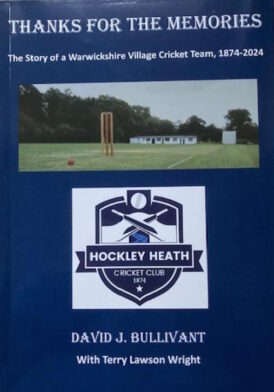Thanks for the Memories
Martin Chandler |Published: 2024
Pages: 270
Author: Bullivant, David
Publisher: Max Books
Rating: 3.5 stars

I am posting this review simultaneously with that of a club history of Barnard Castle Cricket Club, and my preliminary thoughts on that one, which can be found here, are as relevant to this book as that and I would therefore suggest reading that ‘review’ first, and then coming back to this one.
It was at the same meeting that I acquired the Barnard Castle book that I acquired this one, courtesy of its co-publisher, Max Books. In many ways it is a similar book. Both are substantial A4 sized volumes and have around the same number of pages. That much said font size and lay out mean the word count on this one is much higher.
Both authors have long associations with the clubs they write about, although of course Stephen Brenkley has the advantage of being a professional wordsmith. I do of course appreciate that there is a not insignificant difference between short form and long form writing, but at the same time there are plenty of transferable skills. As a retired Chartered Surveyor David Bullivant is cut from different cloth.
Hockley Heath is a village in Warwickshire of around 2,000 souls. It is around 180 miles south of Barnard Castle and its population of something in excess of 5,000, which makes it a small town. The two clubs have both been around a long time and the publication of Bullivant’s book coincides with his club’s 150th anniversary.
As with Small Town, Big Dreams I decided at the outset that, at least at the present time, I am not going to find the time to read Thanks for the Memories from cover to cover, but again I have spent a good hour going through the book, which is long enough to develop the utmost respect for the effort Bullivant has put in and to get very much more than just a flavour of what the book is about. Again, to use the same expression as with Brenkley’s book, this one certainly exceeded my expectations.
And repeating myself yet again I cannot see any reason why anyone with a connection with Hockley Heath would not want to own a copy of this substantial source of information about the club and those who have been involved with it. Bullivant has not had access to a great deal in the way of written archives, so has had to rely a good deal on press reports for the club’s early history. That said having been associated with the club since the 1960s he has over many years had the opportunity to talk to plenty of people whose memories went back a long way.
There are a large number of profiles of the men who have played for Hockley Heath down the years, and many quotes about them from their teammates and others. Perhaps unsurprising, but still impressive, are the number of members of some individual families who feature, the Bullivants being one such.
The major surprise as I leafed through the book was learning that the club effectively ceased to exist in 2007 as it merged with near neighbours Dorridge, a community more than five times the size of Hockley Heath. That was a situation that lasted until 2020 when, at what must be the most difficult time to do so, the Hockley Heath club was reformed due principally to the efforts of Richard King.
And what of the years ahead? That is a slightly worrying aspect. Currently the club lacks a home ground and sounds as if it is reliant on too few individuals for its future to be considered in any way secure. Village cricket is one of the very finest British institutions and I sincerely hope it survives and, Bullivant taking nothing from the book and passing all profits on to the club, that in itself is reason enough to buy this one. Copies are available from Max Books.






This is great read.Full of anecdotes about the characters who played for this village club..Not all about statistics.Lots of humorous tales about the lives of village cricketers.
Comment by Philip Dawes | 10:19am GMT 3 December 2024